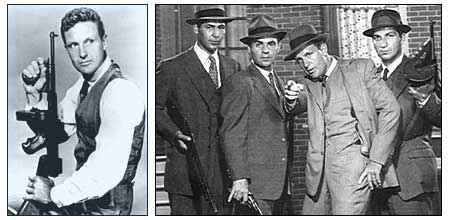The Untouchables

Synopsis of TV Show
If you think public outcry against violence in the media is a relatively modern phenomenon, think again. Television’s The Untouchables was roundly criticized for its violence, because before it or since, nothing packed in the bloody tommy gun shootouts quite like it.
In the 1930’s, gangsters and G-Men alike were busy dealing with the fallout of Prohibition. Real-life government agent Eliot Ness put Al Capone in jail for tax evasion, and because he and his team of law enforcers couldn’t be bribed (and back then, practically everyone had their price), they were nicknamed “The Untouchables.” In real life, Ness and his men went their separate ways after Capone’s arrest, but the series had them stay together well into the 40’s, going gun to gun against nearly every famous gangster of the time, with some Nazis and presidential assassins thrown in for good measure.
Desilu, the production company owned by Lucille Ball and Desi Arnaz, produced the two-hour TV Untouchables movie that started it all—based on the 1947 novel co-written by Ness. It had a course, documentary feel to it, and the voice-over drone, which added a sense of reality to the proceedings, came courtesy of Walter Winchell, the ubiquitous voice of 30’s and 40’s era newsreels (and who, incidentally, had actually pointed a Communist-witch hunter finger at none other than Lucille Ball a few years prior). The TV movie was such a success that years later, it was even released as a movie in the theaters.
Several networks vied for the rights to make an Untouchables series, but ABC won the bidding war and insisted that each episode be as action-packed as the pilot. By the end of the second season, The Untouchables was a ratings hit, and the producers claimed that real-life shady sorts called in with kudos and even suggestions for story ideas. But unfortunately, Ness and the gang had also attracted plenty of controversy.
In the show, Eliot Ness’ most frequent enemy was Frank Nitti, Al Capone’s right-hand man and the leader of Capone’s empire after Ness sent the big man to the pokey. And when it wasn’t Nitti raising hell, you can bet it was some other Italian-American—which left Italian civic groups up in arms about their biased portrayal. The FBI was unhappy because the show insinuated that it was Ness who arrested crooks like George “Bugsy” Moran and Ma Barker, when it was actually the Agency. The real Capone family was unhappy that the show was making money off of Al’s name and likeness. And as always, there was much public outcry over the constant bloodshed.
Desi Arnaz, the network, and the chairman of the Italian-American League to Combat Defamation made peace with one another and agreed that no more Italian surnames would be used for the bad guys. In the show’s last years, its violence was toned down substantially, and gangsters of various non-Italian ethnicities popped up—there was even a Russian villain named Joe Vodka. But the show wasn’t the same anymore, and the very things that angered special interest groups were the things that made it a naughty viewing pleasure. Now on Tuesday nights, watchers were starting to skip the Chicago crime scene altogether, and tune into Jack Benny or The Price is Right.
Though a good crime-busting premise will sometimes take a breather, it never completely retires. Brian De Palma directed a new The Untouchables feature film in 1987, starring Kevin Costner and based loosely on Ness’ book and the resulting series. Producer Quinn Martin went on to produce a number of other crime dramas, including The FBI and The Streets of San Francisco, both employing the same type of ominous narration that Walter Winchell provided on The Untouchables. The later shows had more revolvers than tommy guns, but the same type of quasi-authentic (by Hollywood standards, at least) look at crime.
Release History of Prime Time Show
10/15/59 - 9/10/63 ABCTV Sub Categories
action/adventureTelevision Network
ABCTelevision Studio
ABCTV Cast
Eliot Ness Robert StackAgent Martin Flaherty (1959-60) Jerry Paris
Agent William Youngfellow Abel Fernandez
Agent Enrico Rossi Nick Georgiade
Agent Cam Allison (1960) Anthony George
Agent Lee Hobson (1960-63) Paul Picerni
Agent Rossman (1960-63) Steve London
Frank Nitti Bruce Gordon
Al Capone Neville Brand
Joe Kulak Oscar Beregi Jr.
Captain Jim Johnson (1961-63) Robert Bice
LaMarr Kane (1959) Chuck Hicks
Pete Konitz (1961-62) Carl Milletaire
Frankie Resco (1961-62) Grant Richards
Beecher Asbury Frank Wilcox
Narrator Walter Winchell
Captain Dorsett (1960-61) Jason Wingreen
